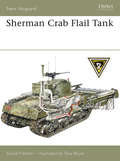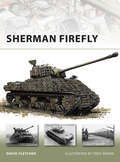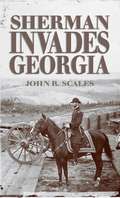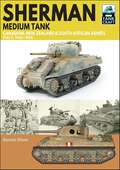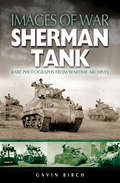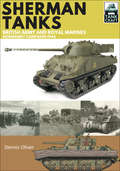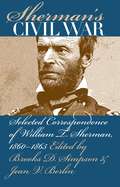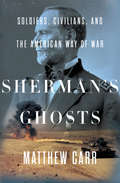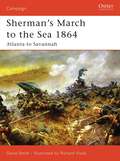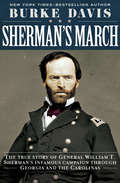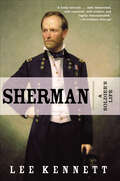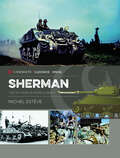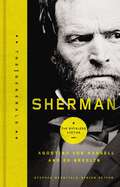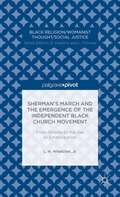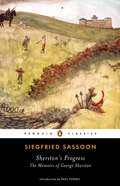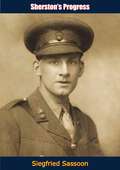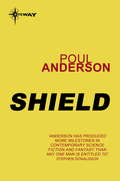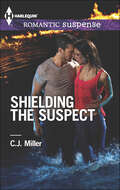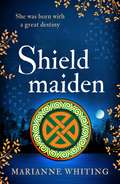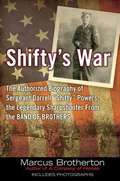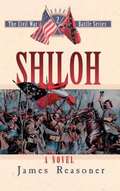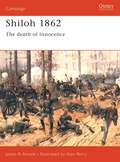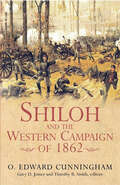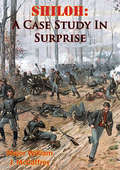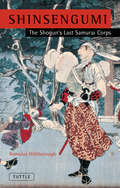- Table View
- List View
Sherman Crab Flail Tank
by Tony Bryan David FletcherIn this title, David Fletcher relates the story of the Sherman Crab Flail using rare sources and photographs. Among the first tanks ashore on D-Day, the "Crab" proved its worth both in its mine-clearing role and as a fighting machine. This book recounts some of its more glorious moments with the famous British 79th Armoured Division and the US Army, giving a detailed exploration of the history of a powerful and innovative machine and the deadly mines it faced.
Sherman Firefly
by Tony Bryan David FletcherThe most powerfully gunned tank fielded by the Allies during World War II was the Sherman Firefly. An ordinary American-built Sherman modified by the British, the Firefly had the firepower that could finally match the awesome German tanks that had dominated Europe. David Fletcher examines the controversy that dogged the Firefly and the psychological boost the tank provided to Allied forces. Exploring its successes and failures on the battlefield and providing a realistic assessment of the tank's worth, this is essential reading for anyone wanting to know the facts about a tank variant that quickly developed its own mythology.
Sherman Invades Georgia
by John R. ScalesA longtime Special Forces officer with a Ph.D. in systems engineering presents a new perspective on one of the legendary campaigns of the Civil War, General William T. Sherman's invasion of Georgia. Unlike most Civil War books that either treat individual battles and campaigns in a historical sense and give short shrift to planning, or study campaign planning with snippets from various campaigns to document specific features, General John Scales's book takes advantage of modern planning techniques to fully examine what went into the Georgia campaign. He has limited the information in his book to that possessed by General Sherman at the time, as documented in his correspondence during the campaign and not in his after-the-fact reports and autobiography. Laid out in chapters that follow the format of an "estimate of the situation," this book doesn't simply recount the facts or attempt to provide a definitive history - other books do that - rather it offers a narrative of the campaign that illustrates a logical decision-making process as formulated in modern times. Published in cooperation with the Associations of the United States Army, the book serves two audiences: military professionals can use it for training purposes and Civil War buffs and interested laymen can gain a sense of the uncertainty that real commanders face by not having all the records of both sides at hand.
Sherman Medium Tank: Canadian, New Zealand & South African Armies Italy 1943–1945
by Dennis OliverThe Sherman tank served with most Allied armies during the Second World War and it is justly famous for the role it played in the Normandy landings and the subsequent drive into Germany. But the part played by the British commonwealth armored units in the Italian campaign is less well known and in his latest volume in the TankCraft series Dennis Oliver uses wartime photos, extensively researched text and highly-detailed color illustrations to cover the Sherman tanks of the Canadian, New Zealand and South African armies that battled their way up the Italian peninsula. Although it was often out-gunned by its opponents the Sherman’s ability to handle the worst terrain and its mechanical reliability ensured that it was at the forefront of every battle and contributed greatly to the final Allied victory. Examined in this book are both the 75mm armed version and the potent tank killer referred to toady as the Firefly, as well as a number of little-known field modifications. A large part of this work showcases available model kits and aftermarket products, complemented by a gallery of beautifully constructed and painted models in various scales. Technical details as well as modifications introduced during production and in the field are also examined, providing everything the modeller needs to recreate an accurate representation of these historic vehicles.
Sherman Tank: Rare Photographs From Wartime Archives (Images Of War Bks.)
by Gavin BirchA brilliant and prolific collection of rare photographs celebrating the war-winning qualities of arguably the most important tank of the Second World War. Many of the marvelous images have never been seen before but thanks to the author, who has special access to the IWM archive they are now available with full authoritative captions.
Sherman Tanks of the British Army and Royal Marines: Normandy Campaign 1944 (TankCraft)
by Dennis Oliver&“One neat book full of markings for British Shermans. It will greatly appeal to both modelers and AFV enthusiasts and historians.&”—AMPS Indianapolis With production in excess of 55,000, the Sherman tank was eventually in service with most Allied armies of the Second World War and by the time of the Normandy landings was the mainstay of Britain&’s armored battalions. In his second book in the TankCraft series, Dennis Oliver uses wartime photos and extensively researched, exquisitely presented color illustrations to cover the Sherman tanks used by the units of the Royal Armoured Corps and the Royal Marines during the fighting in northern France. As with all the books in the TankCraft series, a large part of this work showcases available model kits and aftermarket products, complemented by a gallery of beautifully constructed and painted models in various scales. Technical details as well as modifications introduced during production and in the field are also explained as is the complex system of markings employed by British armored regiments. This book will give the modeler all the information and knowledge required to recreate an authentic miniature representation of the tanks that fought from the beaches of Normandy, through the battles for Caen and on to killing fields of Falaise. &“Provides a clear overview of the Sherman tank in British service during the Normandy Campaign. This will appeal to anyone with an interest in armoured warfare and the period covered. Much Recommended.&”—Firetrench &“A good-value reference for any Sherman fan, but particularly those new to the subject and who favour &‘Blighty&’s&’ armour.&”—Airfix Model World
Sherman's Civil War
by Brooks D. Simpson Jean V. BerlinThe first major modern edition of the wartime correspondence of General William T. Sherman, this volume features more than 400 letters written between the election of Abraham Lincoln in 1860 and the day Sherman bade farewell to his troops in 1865. Together, they trace Sherman's rise from obscurity to become one of the Union's most famous and effective warriors.Arranged chronologically and grouped into chapters that correspond to significant phases in Sherman's life, the letters--many of which have never before been published--reveal Sherman's thoughts on politics, military operations, slavery and emancipation, the South, and daily life in the Union army, as well as his reactions to such important figures as General Ulysses S. Grant and President Lincoln. Lively, frank, opinionated, discerning, and occasionally extremely wrong-headed, these letters mirror the colorful personality and complex mentality of the man who wrote them. They offer the reader an invaluable glimpse of the Civil War as Sherman saw it.
Sherman's Ghosts: Soldiers, Civilians, and the American Way of War
by Matthew CarrThis &“thought-provoking&” military history considers the influence of General Sherman&’s Civil War tactics on American conflicts through the twentieth century (The New York Times). &“To know what war is, one should follow our tracks,&” Gen. William T. Sherman once wrote to his wife, describing the devastation left by his armies in Georgia. Sherman&’s Ghosts is an investigation of those tracks, as well as those left across the globe by the American military in the 150 years since Sherman&’s infamous &“March to the Sea.&” Sherman&’s Ghosts opens with an epic retelling of General Sherman&’s fateful decision to terrorize the South&’s civilian population in order to break the back of the Confederacy. Acclaimed journalist and historian Matthew Carr exposes how this strategy, which Sherman called &“indirect warfare,&” became the central preoccupation of war planners in the twentieth century and beyond. He offers a lucid assessment of the impact Sherman&’s slash-and-burn policies have had on subsequent wars and military conflicts, including World War II and in the Philippines, Korea, Vietnam, and even Iraq and Afghanistan. In riveting accounts of military campaigns and in the words of American soldiers and strategists, Carr finds ample evidence of Sherman&’s long shadow. Sherman&’s Ghosts is a rare reframing of how we understand our violent history and a call to action for those who hope to change it.
Sherman's March to the Sea 1864: Atlanta to Savannah
by David SmithRiding on the wave of his victory at Atlanta, Union General W. T. Sherman abandoned his supply lines in an attempt to push his forces into Confederate territory and take Savannah. During their 285-mile 'March to the Sea' the army lived off the land and destroyed all war-making capabilities of the enemy en route. Despite the controversy surrounding it, the march was a success. Supported by photographs, detailed maps, and artwork, this title explores the key personalities and engagements of the march and provides a detailed analysis of the campaign that marked the 'beginning of the end' of the Civil War.
Sherman's March: The First Full-length Narrative Of General William T. Sherman's Devastating March Through Georgia And The Carolinas (Vintage Civil War Library)
by Burke DavisA New York Times–bestselling author&’s account of the devastating military campaign that broke the Confederacy&’s back in the last months of the Civil War. In November 1864, just days after the reelection of President Abraham Lincoln, Gen. William T. Sherman vowed to &“make Georgia howl.&” The hero of Shiloh and his 65,000 Federal troops destroyed the great city of Atlanta, captured Savannah, and cut a wide swath of destruction through Georgia and the Carolinas on their way to Virginia. A scorched-earth campaign that continues to haunt the Southern imagination, Sherman&’s &“March to the Sea&” and ensuing drive north was a crucial turning point in the War between the States. Weaving together hundreds of eyewitness accounts, bestselling author Burke Davis tells the story of this infamous episode from the perspective of the Union soldiers and the Confederate men and women who stood in their path. Eloquent, heartrending, and vastly informative, Sherman&’s March brilliantly examines one of the most polarizing figures in American military history and offers priceless insights into the enduring legacy of the Civil War.
Sherman: A Soldier's Life
by Lee B. KennettIn Sherman, acclaimed military historian Lee Kennett offers a bold new interpretation of William T. Sherman as civilian, solider, and postwar army commander. This vividly detailed picture follows Sherman from his education at West Point to his abortive career as a San Francisco banker to his triumphant role as Civil War hero. Sherman’s actions during the Civil War were not without controversy, and he was at one point accused of mental incompetence. But with a blend of drive, determination, and mastery of detail, he would go on to become a remarkable leader, capture Atlanta and Savannah in the Great March, and help end the war. Drawing on previously unexplored research, Kennett presents a comprehensive portrait of this singular individual who had so much impact on American history. Lee Kennett is a Professor Emeritus of History at the University of Georgia and the author of G.I.: The American Soldier in World War II and Marching Through Georgia. He lives in North Carolina. “A lively account ... Well-researched, well-reasoned, well-written, and highly recommended.” — Providence Journal
Sherman: The M4 Tank in World War II (Casemate Illustrated Special)
by Michel Esteve“A superbly organized, well-written, detailed history of the Sherman tank” with hundreds of photos and diagrams included (Armor Magazine).The Medium Tank, M4, better known to the British as the Sherman, was the most widely used medium tank by the United States and western Allies in World War II. Reliable, relatively cheap to produce, and easy to maintain, thousands were distributed to the British Commonwealth and the Soviet Union by the Lend-Lease program. It first saw combat in North Africa, where it outclassed lighter German and Italian tanks. By 1944 the M4 was outgunned by the German heavy tanks, but it still contributed to the fight when deployed in numbers and supported by artillery and fighter-bombers.A detailed insight into the development and deployment of the M4, this book covers the design and construction of the chassis, turret, engine, armaments, and munitions, and differences between the variants of the M4. It covers the difficulties facing the crews who fought in this legendary tank, exploring the training they received and the different combat methods perfected by the Allies, including landing from a landing craft, maneuvering in the bocage of Normandy, and fighting in the snow.Fully illustrated with hundreds of contemporary and modern photographs and detailed diagrams, this complete account provides all the technical details of the construction of the M4, its maintenance and repair, and the logistics required to support it in combat.Whether you are a collector, a modeler, or simply passionate about military history, this book will provide you with an unparalleled insight into the M4.“Period photos, preservation shots, interior details, variant schematics, archival excerpts, armament and ammunition drawings, and more . . . Make it your introduction to this legendary tank family.” —Cybermodeler
Sherman: The Ruthless Victor (The Generals)
by Ed Breslin Agostino Von HassellHe was named after an enemy of the United States. He was proslavery despite his loyalty to the Union. He burned and pillaged an already beaten foe on a march history will never forget.If, as he famously said, "war is hell," William Tecumsah Sherman can be classified as a flamethrower of ruthless ferocity. Defined by his contradictions, Sherman achieved immortality in his role as Ulysses Grant's hammer in the Civil War. A failed banker and lawyer, Sherman found his calling with the outbreak of war in 1861. With indecision a common ailment among Union generals early the conflict, Sherman's temperment and unwavering focus on the mission at hand-preserving the Union-helped shift the fortunes of North and South.Authors Agostino Von Hassell and Ed Breslin present Sherman as once man and phenomenon. From Bull Run to Shiloh, from Vicksburg to Chattanooga, and from Atlanta to Savannah, Sherman carved the Confederacy with a feral singularity of purpose. At times disheveled and informal to a fault, "Uncle Billy" became a hero whose legend only grew with allegations of villainy.
Sherman’s March and the Emergence of the Independent Black Church Movement: From Atlanta to the Sea to Emancipation
by Jr. L. H. WhelchelA discourse on the historical emergence of African American Churches as dynamic cultural presences which occurred in the aftermath of the Civil War, and specifically in the wake of General Sherman's march from Atlanta to Savannah.
Sherston's Progress
by Paul Fussell Siegfried SassoonThe third volume in Siegfried Sassoon’s beloved trilogy, The Complete Memoirs of George Sherston, with a new introduction by celebrated historian Paul Fussell A highly decorated English soldier and an acclaimed poet and novelist, Siegfried Sassoon won fame for his trilogy of fictionalized autobiographies that wonderfully capture the vanishing idylls of Edwardian England and the brutal realities of war. Having been deemed mentally ill for his anti-war sentiments and sent for treatment, George Sherston comes under the care of neurologist Dr. W. H. R. Rivers, who allows Sherston to sort through his attitudes toward the fighting (events that have also been semi-fictionalized by Pat Barker for her bestselling and critically acclaimed Regeneration Trilogy). After six months in the hospital, Sherston leaves to rejoin his regiment. He is soon dispatched to Ireland, where he attempts to reclaim some of the idyllic fox-hunting days of his youth, then to Palestine. He finally ends up at the Western Front in France, where he is shot in the head while on a reconnaissance mission and invalided back home. As the capstone of Sassoon's masterful Sherston trilogy, Sherston's Progress—whose evocation of Bunyan's Pilgrim's Progress is not at all accidental—literally brings home the unforgettable journey of George Sherston from aristocratic childhood through war hero and anti-war martyr, all the way to wounded veteran trying to move on from the Great War. .
Sherston’s Progress (Memoirs of George Sherston #3)
by Siegfried SassoonThis autobiographical novel of the eminent English poet, Siegfried Sassoon was first published in 1936. Following on from Memoirs of a Fox-Hunting Man (1928) and Memoirs of an Infantry Officer (1930), Sassoon’s third and final instalment, Sherston’s Progress, is set in an asylum for shell-shocked officers, and deals with the author’s final acceptance of these realities, and ultimately to resolve his emotional turmoil.Sassoon’s fluid, sensitive prose, the fine perceptions of the poet, is spoken here in the voice of the average man. With charm and humor and quiet understatement, he has managed to articulate the hidden feelings of any sensitive man who in the normal course of his life is suddenly exposed to the nightmare of war.A gripping finale to the trilogy.
Shield
by Poul AndersonKoskinen had returned to earth with a strange new "Shield" - a device which enclosed the wearer in a force shield which absorbed all energies below a certain level. Light could come through the Shield, but no weapon known to man could penetrate it.Koskinen had developed the Shield in collaboration with the Martians. From the moment of his return to earth he was in deadly danger. His own country sent men to kill him to prevent the Shield from falling into enemy hands.Soon the whole civilised world was searching for this one man - a man armed with the greatest potential military weapon mankind had ever seen the only question was which power would possess the Shield as its very own?
Shielding the Suspect
by C.J. MillerC.J. MILLER WEAVES A STORY OF DECEPTION AND FRAMING THAT WILL KEEP YOU GUESSING....She woke up on her ex-fiancé's boat with his blood on her hands. Is it possible that Susan Prescott killed Justin and didn't remember it? When the artist is accused of murder, the only one who will believe and protect her is Brady Truman. Brady, her former lover. Brady, who must dispel his agonizing self-doubts if he hopes to help anyone else....To find the real killer-and the hit men gunning for them-Susan and Brady have to deal with their still-simmering desire.It all hinges on Susan's memory. Will returning to the boat trigger her recall...or plunge her deeper into danger?
Shieldmaiden: The Shieldmaiden Trilogy (The Shieldmaiden Trilogy #1)
by Marianne Whiting'I so enjoyed this book. It was easy to read and a joy for anyone who enjoys reading about the Viking culture... I absolutely loved this book' ***** Amazon VINE VOICE review'Good character description and development. An interesting and engaging story... This book ticks all these boxes. A great Read' ***** Amazon review'The author has managed to weave historical fact into the story beautifully. I thoroughly enjoyed it and look forward to reading the next one of the trilogy' ***** Amazon reviewThe first book in the compelling Shieldmaiden Trilogy about a young Viking who must grow from a headstrong teenager into a woman and respected warrior.________She was born with a great destiny...A young Viking woman picks up her sword and goes in search of retribution and justice. In 934 the English are fighting the Norse for supremacy over the North. Worship of the old Norse gods is challenged by Christianity. Traditional loyalties are tested and revenge can be swift and violent. In Cumbria a man is outlawed and killed. Faced with a life of destitution and servitude, his daughter Sigrid's only option is to appeal to the King of Norway to reverse his judgement on her father and allow her to inherit the family farm. But Norway is far away and Sigrid has only her wits and her skill with the sword to help her cause. Sigrid sets out to regain her birthright, encountering kings, warriors and villains on her quest. While her fighting skills earn her admiration, she must also learn about duty, honour and loyalty if she is to grow from a headstrong teenager into a woman and a respected warrior.
Shifty's War
by Marcus BrothertonAs a boy growing up in the remote mining town of Clinchco, Virginia, Darrell "Shifty" Powers's goal was to become the best rifle shot he could be. His father trained him to listen to the woods, to "see" without his eyes. Little did Shifty know his finely-tuned skills would one day save his life--and the lives of his friends. As one of the original men who trained at Camp Toccoa, Georgia, Shifty was one out of only two soldiers in Easy Company to initially earn the coveted expert marksman designation. He parachuted into France on D-day and fought for a month in Normandy; eighty days in Holland; thirty-nine in the harshly cold winter of Bastogne; and for nearly thirty more near Haguenau, France, and the Ruhr pocket in Germany. Shifty's War is a tale of heroism and adventure, of a soldier's blood-filled days fighting his way from the shores of France to the heartland of Germany, and the epic story of how one man's skills as a sharpshooter and engagingly unassuming personality propelled him to a life greater than he could have ever imagined.
Shiloh (The Civil War Battle Series, Book #2)
by James Reasoner[From the back cover] Ahead of Cory, flashes of light split the early morning grayness. Those were the muzzle flashes of the rifles the Yankees were firing at them, he realized. He stopped trotting forward and brought up his rifle, pulling back the hammer as he did so. He saw a flash not too far ahead of him, aimed toward the spot where it had been, and fired. Then he dropped to one knee and reached for the pouch on his belt, fumbling out one of the paper cartridges. As he bit the end of the cartridge and tore it open with his teeth, he sensed as much as heard something whip past him, just above his head. A feeling colder even than the Tennessee River washed through him. That was a Yankee minie ball that had just missed him, he realized. If he had not knelt down to reload, it would have caught him squarely in the chest. One of the Yankees had aimed at his muzzle flash, just as he had aimed at theirs. His hands shook a little. He forced them to be steady as he poured the powder from the cartridge down the barrel of his rifle, then followed it with a piece of wadding and tamped it home with the ramrod. The conical bullet followed that, and Cory rammed it down as well. He came to his feet as he slid the ramrod back into its slot under the barrel of the rifle. He thumbed back the hammer and put a percussion cap on the strike plate, pressing down so that it was well seated. The rifle was ready to fire again He felt like throwing it down, turning, and running. The firing was fierce all around him. Cory looked for the Texan and saw the man's back disappearing into the gloom up ahead. Cory followed, hoping that he wouldn't run right into a Yankee bullet.
Shiloh 1862
by James Arnold Alan PerryThe first major battle in the Western theatre of the American Civil War (1861-1865), Shiloh came as a horrifying shock to both the American public and those in arms. For the first time they had some idea of the terrible price that would be paid for the preservation of the Union. On 6 April 1862 General Albert Sidney Johnston caught Grant and Sherman by surprise and very nearly drove them into the River Tennessee, but was mortally wounded in the process. Somehow Grant and Sherman hung on and the next day managed to drive back the hordes of grey-clad rebels.
Shiloh and the Western Campaign of 1862
by O. Edward Cunningham“May well be the best, most perceptive and authoritative account of the Battle of Shiloh.” —The Weekly StandardThe bloody and decisive two-day battle of Shiloh on April 6-7, 1862 changed the entire course of the American Civil War. The stunning Northern victory thrust Union commander Ulysses S. Grant into the national spotlight, claimed the life of Confederate commander Albert S. Johnston, and forever buried the notion that the Civil War would be a short conflict.The conflagration had its roots in the strong Union advance during the winter of 1861-1862 that resulted in the capture of Forts Henry and Donelson in Tennessee. The offensive collapsed General Johnston’s advanced line in Kentucky and forced him to withdraw all the way to northern Mississippi. Anxious to attack the enemy, Johnston began concentrating Southern forces at Corinth, a major railroad center just below the Tennessee border. His bold plan called for his Army of the Mississippi to march north and destroy General Grant’s Army of the Tennessee before it could link up with another Union army on the way to join him.On the morning of April 6, Johnston boasted to his subordinates, “Tonight we will water our horses in the Tennessee!” They nearly did so. Johnston’s sweeping attack hit the unsuspecting Federal camps at Pittsburg Landing and routed the enemy from position after position as they fell back toward the Tennessee River. Johnston’s death in the Peach Orchard, however, coupled with stubborn Federal resistance, widespread confusion, and Grant’s dogged determination to hold the field, saved the Union army from destruction. The arrival of General Don C. Buell’s reinforcements that night turned the tide of battle. The next day, Grant seized the initiative and attacked, driving the Confederates from the field. Shiloh was one of the bloodiest battles of the entire war, with nearly 24,000 killed, wounded, and missing.Edward Cunningham, a young Ph.D. candidate, researched and wrote Shiloh and the Western Campaign of 1862 in 1966. Though it remained unpublished, many Shiloh experts and park rangers consider it the best overall examination of the battle ever written. Indeed, Shiloh historiography is just now catching up with Cunningham, who was decades ahead of modern scholarship. Now, Western Civil War historians Gary Joiner and Timothy Smith have resurrected this beautifully written, deeply researched manuscript from undeserved obscurity. Fully edited and richly annotated with updated citations and observations, original maps, and a complete order of battle and table of losses, it represents battle history at its finest.
Shiloh: A Case Study In Surprise
by Major William J. McCaffreyThe commander must remain ever vigilant against surprise, for attacks born of the unexpected have the potential to alter quickly and irreversibly the relative combat power of opposing forces. A commander is better prepared to meet this threat when he is familiar with those factors which have contributed to surprise during past conflicts. This thesis investigates the surprise phenomenon through a case study of the battle at Shiloh Church.General Ulysses S. Grant, during the American Civil War, bivouacked his army near Shiloh Church on the Tennessee River's west bank while he awaited General Don Carlos Buell and the Army of the Ohio. On Buell's arrival the combined armies were to attack Corinth, Mississippi, where the Confederate forces under General Albert Sidney Johnston were known to be entrenched. Realizing the combined strength of the two Union armies would eventually prove overwhelming, Johnston decided to attack Grant's position before Buell could reinforce. He therefore attacked early Sunday morning, 6 April 1862. Apparently unaware that an attack was imminent, Grant had encamped his army with little regard for defense. The Confederates enjoyed success and forced the Union army against the Tennessee River. However, Buell reinforced Grant that evening, and on the following day the Union armies counterattacked and drove the Confederates back toward Corinth. Thus, the battle ended on a rather indecisive note.Among the more important conclusions of the thesis are:1. Although the Union forces below division level anticipated the Confederate attack. Grant and his command echelon were completely surprised.2. Surprise was achieved because the Union had violated several principles of war, chiefly: objective, offensive, maneuver, unity of command, and security.3. The Confederates were not without fault, for, had certain mistakes been avoided, their army might have won a total victory.
Shinsengumi: The Shogun's Last Samurai Corps
by Romulus HillsboroughShinsengumi: The Shogun's last Samurai Corps is the true story of the notorious samurai corps formed in 1863 to arrest or kill the enemies of the Tokugawa Shogun.<P><P>The only book in English about the Shinsengumi, it focuses on the corps' two charismatic leaders, Kondo Isami and Hijikata Toshizo, both impeccable swordsmen. It is a history-in-brief of the final years of the Bakufu, which collapsed in 1867 with the restoration of Imperial rule. In writing Shinsengumi, Hillsborough referred mostly to Japanese-language primary sources, including letters, memoirs, journals, interviews, and eyewitness accounts, as well as definitive biographies and histories of the era.The fall of the shogun's government (Tokugawa Bakufu, or simply Bakufu) in 1868, which had ruled Japan for over two and a half centuries, was the greatest event in modern Japanese history.The revolution, known as the Meiji Restoration, began with the violent reaction of samurai to the Bakufu's decision in 1854 to open the theretofore isolated country to "Western barbarians." Though opening the country was unavoidable, it was seen as a sign of weakness by the samurai who clamored to "expel the barbarians."Those samurai plotted to overthrow the shogun and restore the holy emperor to his ancient seat of power.
